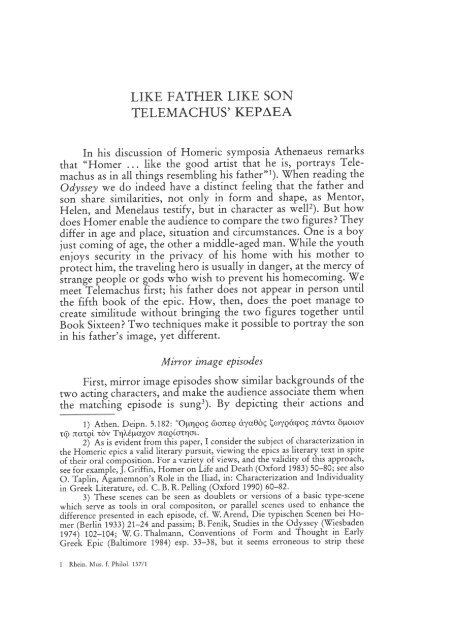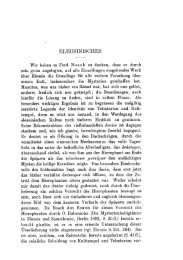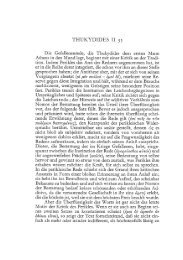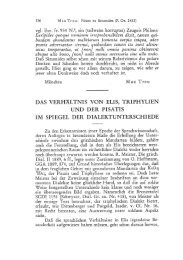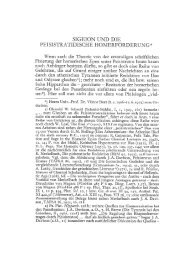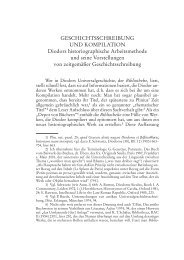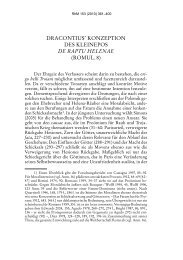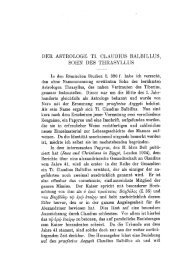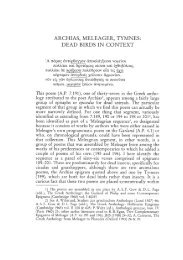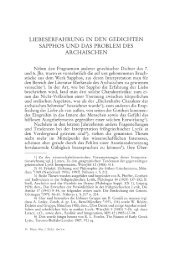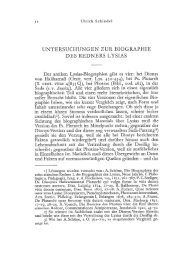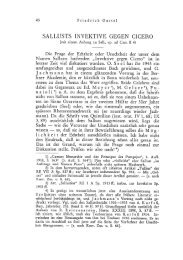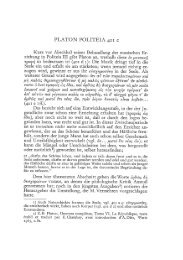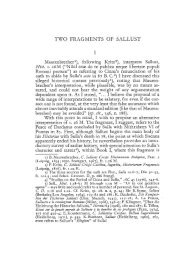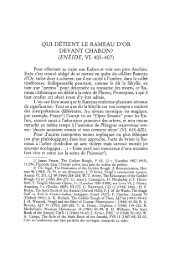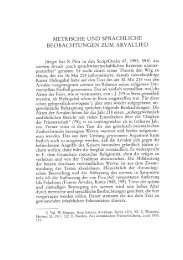LIKE FATHER LIKE SON TELEMACHUS' KEP~EA
LIKE FATHER LIKE SON TELEMACHUS' KEP~EA
LIKE FATHER LIKE SON TELEMACHUS' KEP~EA
Create successful ePaper yourself
Turn your PDF publications into a flip-book with our unique Google optimized e-Paper software.
6 Hanna M. Roisman<br />
By making the equation between the crying woman and Odysseus,<br />
Homer teIls us more about the cause of the tears, which is not<br />
accounted for directly in either the first or second episodes of<br />
Odysseus' crying. This lack of explanation causes modern readers<br />
and scholars to find reasons of their own, which make sense considering<br />
the warlike nature and travel experience of our hero.<br />
Thus, modern scholarship tries to account for Odysseus' tears by<br />
suggesting that he experienced diverse emotions. The tears are said<br />
to be caused by nostalgia, a contrast between his former achievements<br />
and his present ignoble state, sorrow for his lost comrades,<br />
simple grief, or grief that paves the way for hirn to cross from the<br />
world of fantasy to reality, or the memory of past toils 9 ). And yet,<br />
Odysseus is hardly a person who would break down for any of<br />
these reasons. His capability for emotional restraint at all times is a<br />
major characteristic, which enables hirn to use his wiles and resourcefulness<br />
to their maximum. This is a man who does not shed<br />
a tear while watching his wife cry over the memory of her absent<br />
husband (19.209-12). This is a man who endures the misery of his<br />
old and weak father, who mourns for his lost son, and instead of<br />
hugging and kissing hirn, which he feels like doing, addresses hirn<br />
with "insulting words", calling hirn a slave, and lies to hirn<br />
(24.240-79). This is not a man who will cry at the memory of his<br />
past successes. Both songs, whether of his quarrel with AchilIes or<br />
leading the wooden horse into Troy, have a complimentary note to<br />
them. Agamemnon rejoiced at the first one, we are told explicitly.<br />
The stratagern of the horse, thought up by our hero hirnself, was<br />
successful in capturing the city. If we disregard the possibility of<br />
Odysseus' succumbing to nostalgia proper, we should also note<br />
that there was nothing in the song that could sadden our hero's<br />
heart. Furthermore, if Odysseus was indeed concerned about not<br />
exhibiting grief in the company of banqueters, his request for a<br />
song about the wooden horse is puzzling. Wouldn't he expect that,<br />
hearing about his own deeds again would elicit from hirn areaction<br />
similar to the one caused by the story of his quarrel with AchiIles?<br />
One can only conclude that he cried because he wanted totO). The<br />
famous but puzzling simile that compares hirn to a woman who<br />
was crying because of his schemes for her city, teIls us in fact that<br />
9) E.g., Stanford ad loc.; eh. P. Segal, The Phaeacians and the Symbolism of<br />
Odysseus' Return, Arion 1,4 (1962) 27-29; Fenik 43-44; Austin 197; Thalmann<br />
165.<br />
10) For a discussion of the validity of assuming hidden motives on the part<br />
of the character, especially in the Phaeacian episode, see Griffin 62-64.
Like Father Like Son: Telemachus' XEQÖW 11<br />
ambushing hirn - an imponant piece of information in case the<br />
shepherd, or any of his friends, should think of depriving hirn of<br />
his possessions. He has a large family in Crete and allies in Elis and<br />
Pylos. That is, there are enough people to avenge hirn in the event<br />
that any misfonune should befall hirn. We thus see that every<br />
detail of the story Odysseus teIls the shepherd serves to protect<br />
hirn during his stay in Ithaca and advance his interests. His main<br />
goal is to learn about his family and household without revealing<br />
hirnself, and yet he wishes to create the impression that he should<br />
be treated with respect. In sum, our hero invents on the spot a tale<br />
to his own advantage. As the poet says, he is revolving voov JtOf..1Jx€QöEa<br />
(13.255). Hearing the story, Athena calls hirn x€QöaMoe;<br />
claiming that both he and she are best known for their XEQÖEa<br />
(13.291-302).<br />
Throughout the epic, Odysseus is engaged in a variety of<br />
situations that force hirn to choose between two alternatives, and<br />
he always chooses the one that is termed as XEQÖLOV 19 ). His acts are<br />
also referred to by the base X€Qö-, whether by hirnself or others 20 ).<br />
Thus Helen refers to his avoidance of her while in Troy as his<br />
X€QÖOO1JVlj (4.251). After Odysseus asks Demodocus to sing about<br />
his leading the wooden horse to the citadel of Troy, and then cries<br />
ostentatiously and loudly during the song, Alcinous, who watched<br />
Odysseus during his first crying speIl, asks hirn to answer his<br />
questions without using any more VOl'nWLa x€QöaMa (8.548 f.).<br />
Alcinous, thus, has seen the trait XEQÖEa in Odysseus' prior and<br />
current behavior. Eurycleia refers to Odysseus' command to her<br />
not to reveal his identity to Penelope as JtOf..1JX€QÖELTIOL VOOLO<br />
(23.77). And the poet hirnself marks Odysseus' siuing down and<br />
dropping his staff when attacked by Eumaeus' dogs as an act deriving<br />
from the hero's X€Qöo(Jvvlj (14.31).<br />
The base is also allotted to Penelope. Antinoos marks her<br />
XEQÖEa as her most commendable feature (2.88, 118). And in Book<br />
Eighteen, when Penelope decides to show herself to the suitors,<br />
she justifies her decision by telling Eurynome that she wants to tell<br />
her son a word that will be XEQÖLOV to hirn (Jtmöl, ÖE X€V ELJtoqu<br />
EJtoe;, "Co x€ XEQÖLOV ELlj, 166). She explains what she means by EJtoe;<br />
XEQÖLOV, saying "that he should not always go among the insolent<br />
suitors, who speak weIl to hirn, but are plouing evil things for the<br />
19) 9.227; 10.152; 18.92; 19.282; 24.238.<br />
20) Cf. 6.148; 8.163,547; 11.357; 13.254,290,297; 14.30; 14.508; 19.285;<br />
23.139; 23.216; 14.166.
12 Hanna M. Roisman<br />
future" (18.167f.). Yet when finally she appears before the suitors<br />
and addresses Telemachus, she says nothing of the sort. She upbraids<br />
Telemachus for not demonstrating XEQOW, which she says<br />
he used to wield as a child. She relates his inability to employ<br />
XEQOW to his having allowed a beggar to be ill-treated in their<br />
house, referring to the suitors' forcing Odysseus to wrestle with<br />
lrus. Commentators regard Penelope's scolding of Telemachus<br />
and his reply, verses 214-43 of Book Eighteen, as an interpolation.<br />
Munro, for example, says that the dialogue "is intended to be<br />
secret, yet it is carried on in the presence of the suitors". More<br />
recently, critics have tended to explain the episode as exhibiting<br />
the unity of mind between Odysseus and Penelope and how<br />
Penelope's decision to appear before the suitors serves Athena's<br />
purposes. The change in her message is accounted for by her inexplicable<br />
urge to appear before the suitors. She had no particular<br />
message, but made one up when she talked to Eurynome and<br />
makes up a different one when she appears before the suitors 21 ).<br />
Yet it seems that excising this dialogue between the mother<br />
and son is likely to miss an important point. Nor do we need an<br />
intricate explanation of the discrepancy between Penelope's expressed<br />
purpose of showing herself to the suitors and her actual<br />
one. Penelope should speak with her son in private, but she could<br />
hardly have planned it this way. After all, she connects her future<br />
conversation with her son with her appearance before the suitors,<br />
because she assurnes that her son is with the suitors. Her words to<br />
Eurynome include the gist of her message and do not need to be<br />
repeated word for word. Surely it would not be politic and weIl<br />
mannered to tell Telemachus, in front of the suitors, that they are<br />
scheming against hirn. The characters of the Odyssey always prefer<br />
the roundabout approach. Penelope needs to change the wording<br />
to meet the situation. What she could say in a straightforward<br />
manner to Eurynome, she cannot say in front of the suitors. When<br />
she appears, she adjusts her message to the latest example of the<br />
suitors' scheming, and her son's conforming with it: he allows the<br />
suitors to mistreat a guest in his own household. By complying<br />
with the suitors' maltreatment, Telemachus lets them plot against<br />
hirn, for he is responsible for proper hospitality in his own house.<br />
Penelope's upbraiding of Telemachus expresses what she intended<br />
to say but in different words. She still provides her son with an<br />
21) Cf. C. S. Byre, Penelope and the Suitors hefore Odysseus: Odyssey<br />
18.158-303, AJP 109 (1988) 159-173.
18 Hanna M. Roisman<br />
Over the years scholars have had difficulty with this passage, yet<br />
the difficulty was never clearly identified. Munro, for example,<br />
found the passage ironical because, he says, it was not that Ctesippus<br />
missed his target, but that Odysseus saw the hoof coming and<br />
avoided it. However, nothing else in this moving address reveals<br />
sarcasm. There is also a tendency to suspect the word 8uwT>, because,<br />
Munro says, it also occurs at the end of verse 301, and in<br />
neither place does it have a perfectly smooth sense. The common<br />
idiom is not "tOÖE XEgöwv EJ'tAE"tO 8UIl, but
22 Hanna M. Roisman<br />
the listeners, who were explicitly told to watch for it when the<br />
poet qualified the upcoming behavior as xEQöea. Thus just before<br />
the decisive battle with the suitors, before we part with the two<br />
heroes, we are able to see that the son is indeed in his father's<br />
image, even if the situations he faces are less heroic and are supervised<br />
by his wily parent.<br />
Telemachus' character portrayal depends, for a large part, on<br />
comparison with his father. The poet enforces this comparison<br />
with two techniques. He creates situations that demand similar<br />
reactions from the father and the son and lets his listeners draw<br />
their own conclusions from the characters' behavior. By an intricate<br />
use of the theme and words drawn from the base XEQÖ-, he<br />
shows us how the youth aspires to be recognized as an adult equal<br />
to his father. Toward the end of the poem we learn that Telemachus<br />
does not lack his father's major feature: resourcefulness in<br />
responding to an unexpected situation while keeping one's own<br />
interests in mind. Modern scholarship, on the whole, attributes<br />
development to Telemachus' character, yet usually restricts it to<br />
the Telemacheia 33 ). Yet, change and aspiration in the young<br />
character are evident in his encounter with his father, not so much<br />
in acquiring new features, as in revealing inborn characteristics.<br />
Telemachus grows from a youngster incapable of any affectation<br />
to a young man who is capable of independent, wily conduct.<br />
Waterville, Maine Hanna M. Roisman<br />
33) E.J. Woodhouse, The Composition of the Odyssey (Oxford 1930)<br />
212-214, sees the development of the figure of Telemachus as exceptional in the<br />
Greek literature, where character drawing, he maintains, is mainly static. Cf. Austin,<br />
Calif. Stud. in Class. Antiq. 58-59; J. A. Scott, The Journey made by Telemachus<br />
and Its Influence on the Action of the Odyssey, Cl 13 (1917) 420-428;<br />
C. M. H. Miliar & J. W. S. Carmichael, The Growth of Telemachus, G & R n.s. 1<br />
(1954) 58-64; H.C.Clarke, Telemachus and the Telemacheia, AJP 84 (1963)<br />
129-145.


